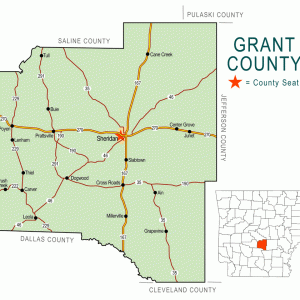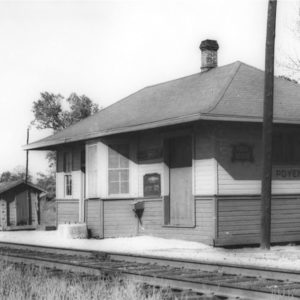calsfoundation@cals.org
Poyen (Grant County)
| Latitude and Longitude: | 34°19’27″N 092°38’24″W |
| Elevation: | 233 feet |
| Area: | 0.31 square miles (2020 Census) |
| Population: | 263 (2020 Census) |
| Incorporation Date: | September 10, 1954 |
Historical Population as per the U.S. Census:
|
1810 |
1820 |
1830 |
1840 |
1850 |
1860 |
1870 |
1880 |
1890 |
1900 |
|
– |
– |
– |
– |
– |
– |
– |
– |
– |
– |
|
1910 |
1920 |
1930 |
1940 |
1950 |
1960 |
1970 |
1980 |
1990 |
2000 |
|
– |
– |
– |
– |
– |
312 |
265 |
329 |
303 |
272 |
|
2010 |
2020 |
|
|
|
|
|
|
|
|
|
290 |
263 |
|
|
|
|
|
|
|
|
The town of Poyen is located in western Grant County. Home to one of the county’s two high schools, the town was formed as a result of railroads and the timber industry, neither of which has remained active in the town into the twenty-first century.
Evidence of prehistoric dwellings in the region of Poyen has been found in archaeological sites marking the presence of native peoples in the area—including, most recently, the Caddo—through the millennia. Settlers of European descent were living in the region as early as 1815. The settlement was known in the nineteenth century as Cross Roads, since roads that crossed at that site led to Benton (Saline County), Camden (Ouachita County), Rockport (Hot Spring County), and Pine Bluff (Jefferson County). A log schoolhouse was built near Cross Roads in 1855; it fell into disrepair and was replaced some years later. A one-room frame schoolhouse was erected at the same location in 1879.
In 1905, the Rock Island Railroad constructed a rail line that passed through Grant County. Both Cross Roads and Fenter (Grant County) applied for a depot from the railroad. After a hearing in Little Rock (Pulaski County), the railroad decided to give the depot to Fenter, about three miles from Cross Roads. Three years later, the settlement’s fortunes changed when the cooperage firm J. H. Hamlen & Son, Inc., built a sawmill and commissary at Cross Roads. The firm created a railroad that ran from Cross Roads to Hot Spring County; the railroad was called the Wyandotte and Southeastern Railroad and operated until 1915.
Railroad company president James Hopkinson Hamlen purchased land at Cross Roads and mapped out a town, which he named Poyen to honor the memory of his ancestor, Joseph Rochemont de Poyen, who fled violence in France in 1792, ending up in Maine. A post office was established in Poyen in 1908, and a new, two-story schoolhouse was built. In the following years, more sawmills were added, as well as a cotton gin and a brick factory. Clay, sand, and gravel were mined near Poyen.
The community grew quickly, with a blacksmith, a hotel, and two churches, as well as the post office, railroad depot, and school. A second hotel was built in 1930. However, the Depression caused a decline in the lumber industry, and the sawmills eventually closed their operations at Poyen. The Rock Island Railroad also fell on hard times, reducing its service through Grant County. The railroad went out of business in 1979, and the tracks were removed in 1983.
In an attempt to reverse its failing fortunes, the town of Poyen incorporated in 1954. This incorporation was a financial benefit to the town, as it brought income from taxation and from the power company. Streets were paved and sidewalks were added in the 1950s and 1960s. A fire department and city hall followed in the 1960s.
In 1957, plans were announced to build a school for underprivileged boys north of Poyen. Named the National Boys Home and Training School, the planned institution was supported by the United Union. A site was dedicated in 1958, and three boys were placed in temporary housing, but the housing was destroyed by fire in November of that year, and the school was never built.
A newspaper was briefly published in Poyen in 1975. Called the Poyen Patter, it was published by the Poyen Jaycettes, a women’s civil club. The paper featured local business ads, club news, school news, poems, recipes, and other items of local interest, but it ceased publication in 1976.
The town of Poyen had a population of 290 in the 2010 census. The K-12 school district serves more than 500 students. The town has an Assembly of God and a Missionary Baptist church. It is also home to several businesses, including a grocery store and hardware store. The school district, though, is the largest employer. Justin Moore, a country singer, was born and raised in Poyen.
For additional information:
Dowling, Patrick C. Barrels & Daring. Southport, NC: Timothy and Company Publishers, 1977.
Goolsby, Elwin L. Our Timberland Home: A History of Grant County. Sheridan, AR: Grant County Museum, 1984.
Steven Teske
Butler Center for Arkansas Studies
 Grant County Map
Grant County Map  Entering Poyen
Entering Poyen  Poyen Cemetery
Poyen Cemetery  Poyen Depot
Poyen Depot  Poyen School
Poyen School  Poyen Street Scene
Poyen Street Scene  Poyen Street Scene
Poyen Street Scene  Poyen Veterans' Memorial
Poyen Veterans' Memorial  Poyen Water Tower
Poyen Water Tower  Poyen Welcome Sign
Poyen Welcome Sign 




Comments
No comments on this entry yet.